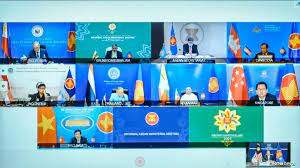ASEAN to Hold Talks on Myanmar Political Crisis

Members of the Association of Southeast Asian Nations, or ASEAN, are holding talks Tuesday to discuss the worsening political crisis in Myanmar.
Foreign ministers representing each of ASEAN’s 10-member nations, which includes Brunei, Cambodia, Indonesia, Laos, Malaysia, the Philippines, Singapore, Thailand and Vietnam, will hold talks via videoconference with their counterpart from member nation Myanmar.
Singapore Foreign Minister Vivian Balakrishnan told lawmakers Monday ASEAN believes the situation in Myanmar would have “serious consequences” for the region, and expressed confidence the bloc could facilitate a “return to normalcy and stability” in the country. He called on all parties to “pursue a long-term peaceful political solution for national reconciliation” including a return to “the path of democratic transition” which can only begin with the immediate release of de facto leader Aung San Suu Kyi, President Win Myint and other high-ranking officials of the deposed civilian government.
Balakrishnan also said ASEAN is “appalled by the use of lethal force against civilians” by Myanmar security forces.
Popular protests staged daily across Myanmar against the military’s February 1 coup have grown increasingly violent and deadly. At least 21 people have been killed since the coup, including 18 people on Sunday, according to the United Nations Human Rights Office, the deadliest day of the unrest.
Witnesses to Sunday’s protests say police used tear gas, rubber bullets, water cannon and in some cases, live ammunition in Yangon, Myanmar’s biggest city. According to The Associated Press, photos of shell cases from live ammunition were posted on social media. Media videos show demonstrators dragging the injured away from the protests, leaving bloody smears on the pavement.
Police also aggressively sought to break up protests in other cities, including Mandalay and Dawei.
Hundreds of protesters wearing construction helmets returned to the streets of Yangon Tuesday chanting slogans against the military regime as they stood behind makeshift barricades. Security forces responded by once again firing tear gas at the demonstrators to disperse them.
The military has claimed widespread fraud in last November’s election, won in a landslide by Suu Kyi’s National League for Democracy party, as justification for last month’s coup. Myanmar’s electoral commission denied the military’s claims of election fraud.
Suu Kyi appeared via videoconference at a court in the capital, Naypyitaw, her first public appearance since she was removed from office and detained by the military.
She was charged with two additional crimes during the session -- attempting to incite public unrest and violating a section of the telecommunications law regarding operating equipment without a license. The 75-year-old Suu Kyi was already charged with illegally importing and using six unregistered walkie-talkie radios found during a search of her home, and for breaking the country’s natural disaster law by holding public gatherings in violation of COVID-19 protocols.
Her next court appearance has been scheduled for March 15.
The United States and other Western nations have demanded Suu Kyi’s release, as well as that of her lieutenants, and called on the junta to restore power to the civilian government.
Senior General Min Aung Hlaing said Monday during an address on state television that protest leaders and "instigators" would be punished. He said the army is also investigating financial abuse by the civilian government.
White House press secretary Jen Psaki said Monday the recent killings of protesters in Myanmar “represent an escalation” of the situation there and said the Biden administration was preparing “further costs on those responsible.”
The new U.S ambassador to the United Nations, Linda Thomas-Greenfield, urged the international community Monday to “ramp up pressure” on Myanmar’s military and said she hopes to use Washington's presidency of the United Nations Security Council in March to push for more "intense discussions" on Myanmar, formerly called Burma.
“It is clear the world is watching the situation in Burma, and it’s clear that we can’t sit still and watch people continue to be brutalized and their human rights to be destroyed,” she said.
The United Nations said Monday that if serious international crimes have taken place in Myanmar, it would investigate. Nicholas Koumjian, head of the U.N. Independent Investigative Mechanism for Myanmar, said if international law has been violated, “we will build case files to facilitate criminal trials to hold those responsible to account in international, regional or national courts.”
Tom Andrews, U.N. special rapporteur for Myanmar, has called on the international community to take collective action against the military junta, including a global arms embargo, sanctions against businesses owned or controlled by the junta, and the convening of the U.N. Security Council to discuss the issue.
Andrews also urged countries that have already established some sanctions to “immediately consider more.”
The junta has declared a one-year state of emergency. Min Aung Hlaing has pledged that new elections will be held to bring about a "true and disciplined democracy” but did not specify when they would take place.
Link: https://www.voanews.com/east-asia-pacific/asean-hold-talks-myanmar-political-crisis











